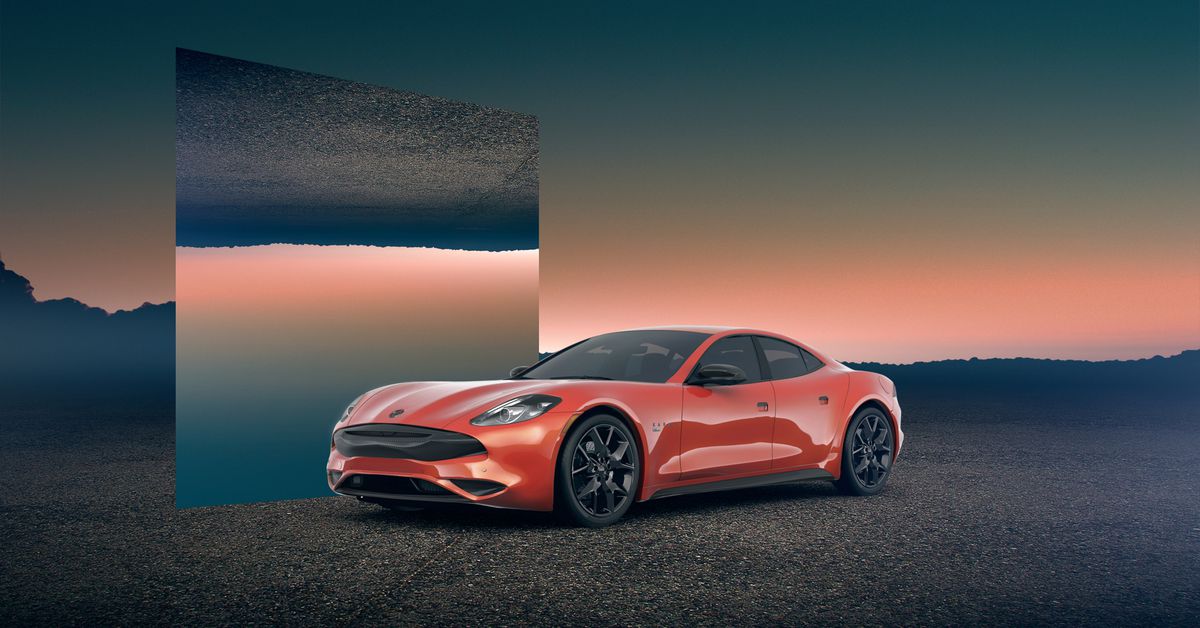Karma’s new GS-6 hybrid is a cheaper version of its luxury sports car

Electric vehicle startup Karma Automotive has fully revealed its newest hybrid car, the GS-6. While it shares the same design as the company’s ultra-luxury sedan, the Revero GT, Karma is pricing the GS-6 at nearly half the price — $83,900 — in a bid to reach a much wider set of customers.
Karma says it’s able to do that because it plans to make more cars at its California production plant, is making them more efficiently, and has streamlined its supply chain, according director of public relations Jeff Holland. “It helps that our parent company also owns our battery supplier A123 Systems, but over the past few years we have also seen a substantial reduction in the cost of lithium ion batteries and other EV-related components including other items such as motors and generators,” Holland told The Verge in an email.
If the new car is successful, Karma could finally realize its goal of becoming a small-volume manufacturer just in time to capitalize on a new wave of optimism (and funding) in the electric vehicle space.
The path to that goal has been difficult so far for Karma. The startup was born in 2014 when Chinese automotive conglomerate Wanxiang Group bought a bulk of the assets of Fisker Automotive following that company’s bankruptcy. Wanxiang named the new startup after the Fisker Karma, the defunct company’s failed hybrid sports car, and ultimately revived that vehicle as the Revero. (Henrik Fisker, who founded Fisker Automotive, now has a new company called Fisker Inc. that is also working on electric vehicles.)
Karma has spent the last few years selling a small number of Revero hybrids for nearly $150,000 while struggling to really get on its feet as Wanxiang allegedly waffled on fully backing the startup, as Jalopnik’s Jason Torchinsky has reported. The startup has been accused of making prototypes that are basically just “movie props,” and may have even considered filing for Chapter 11 bankruptcy protection last year. (Karma has denied both claims.) Karma has also laid off more than one hundred employees over the last two years and took a PPP loan of more than $5 million from the government in 2020.
The GS-6 is meant to help lift Karma out of that turmoil by appealing to a potentially much bigger group of buyers. It’s powered by a BMW-sourced, turbocharged three-cylinder engine and two electric motors that, altogether, generate a total of about 536 horsepower — the same powertrain found in the Revero. A 28kWh battery pack allows for up to 80 miles of driving on electricity alone.
The interior features a touchscreen in the center of the dashboard, which is compatible with Apple CarPlay and Android Auto, as well as a digital instrument cluster for the driver. Karma says it’s sourcing a lot of sustainable materials for the trim and the seats, too, in an attempt to appeal to more conscientious buyers. Karma will sell a Sport and a Luxury trim of the GS-6, and an all-electric version (dubbed GSe-6) is due out later starting at $79,900.
“We are not selling PowerPoints anymore, we’re selling real cars,” Joost de Vries, Karma’s vice president of global sales, said on a conference call with reporters last week. de Vries explained that Karma hopes to target younger buyers with the lower price point, and more of them, too, with a total production capacity of 15,000 cars per year at the California factory. That said, de Vries was quick to point out that the startup has retained many of its older, existing customers whose Revero leases have expired. Karma is “starting to really feel like a more complete auto manufacturer here in the US,” he said.
While Karma has spent time and money developing autonomous technology (it even created an allegedly self-driving van last year), de Vries said that’s not expected to come to the startup’s passenger vehicles any time soon. The GS-6 lineup will have optional driver assistance features like adaptive cruise control and lane keeping, but nothing more. “We’re not seeing anything in our near future on level three or level four,” de Vries said, referring to the Society of Automotive Engineers’ designations for hands-free driving and fully driverless capability within a certain area, respectively. “It’s on the roadmap, but I think we still want to wait another decade or so before the legislative problems have been resolved, and our customers are really not asking for it.”
Karma has a hand in a lot of other advanced technologies, too. The startup has shared that it’s working on a way to use methanol and hydrogen fuel cells to power future electric vehicles. It also hopes to sell the technological platform that powers its cars to other automakers. An SUV is in the works, too.
To fund all of this, Karma announced last July that it had raised a fresh $100 million. That announcement came at the beginning of a wave of electric vehicle companies going public by merging with special purpose acquisition companies (including Fisker Inc.). But so far, Karma remains private. “Our management team is exploring all avenues for a larger financing with investment bankers. And of course, IPO has always been an aspiration for Karma when it is public company ready, but for now the key focus is on growing our business,” a spokesperson told The Verge at the time.








